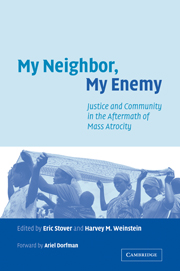Book contents
- Frontmatter
- Contents
- List of contributors
- Foreword by Ariel Dorfman
- Acknowledgments
- Introduction: conflict, justice and reclamation
- Part I Institutional approaches to justice
- Part II Social reconstruction and justice
- Part III Survivors and justice
- Conclusion: a common objective, a universe of alternatives
- Index
Introduction: conflict, justice and reclamation
Published online by Cambridge University Press: 05 May 2010
- Frontmatter
- Contents
- List of contributors
- Foreword by Ariel Dorfman
- Acknowledgments
- Introduction: conflict, justice and reclamation
- Part I Institutional approaches to justice
- Part II Social reconstruction and justice
- Part III Survivors and justice
- Conclusion: a common objective, a universe of alternatives
- Index
Summary
Truth is the cornerstone of the rule of law, and it will point towards individuals, not peoples, as perpetrators of war crimes. And it is only the truth that can cleanse the ethnic and religious hatreds and begin the healing process.
Madeleine Albright, 1993While there are various means to achieve an historic record of abuses after a war, the most authoritative rendering is possible only through the crucible of a trial that accords full due process.
Michael Scharf, 1997We are forced to live together … Because of that we are all pretending to be nice and to love each other. But, it is known that I hate them and they hate me. It will be like that forever.
Mostar resident, 2001I don't understand this word “reconciliation.” I can't reconcile with people, even if they are in prison … If a person comes to ask my forgiveness, I will pardon him after he has resuscitated the members of my family that he killed!
Genocide survivor, Rwanda, 2002Since the fall of the Berlin Wall in 1989, the world has experienced an upsurge of intrastate wars rooted in ethnic and religious differences. From the highlands of Central America to the islands of South-east Asia, whole societies have been torn asunder by violence so virulent and fierce it has turned community against community, neighbor against neighbor.
- Type
- Chapter
- Information
- My Neighbor, My EnemyJustice and Community in the Aftermath of Mass Atrocity, pp. 1 - 26Publisher: Cambridge University PressPrint publication year: 2004
- 24
- Cited by

